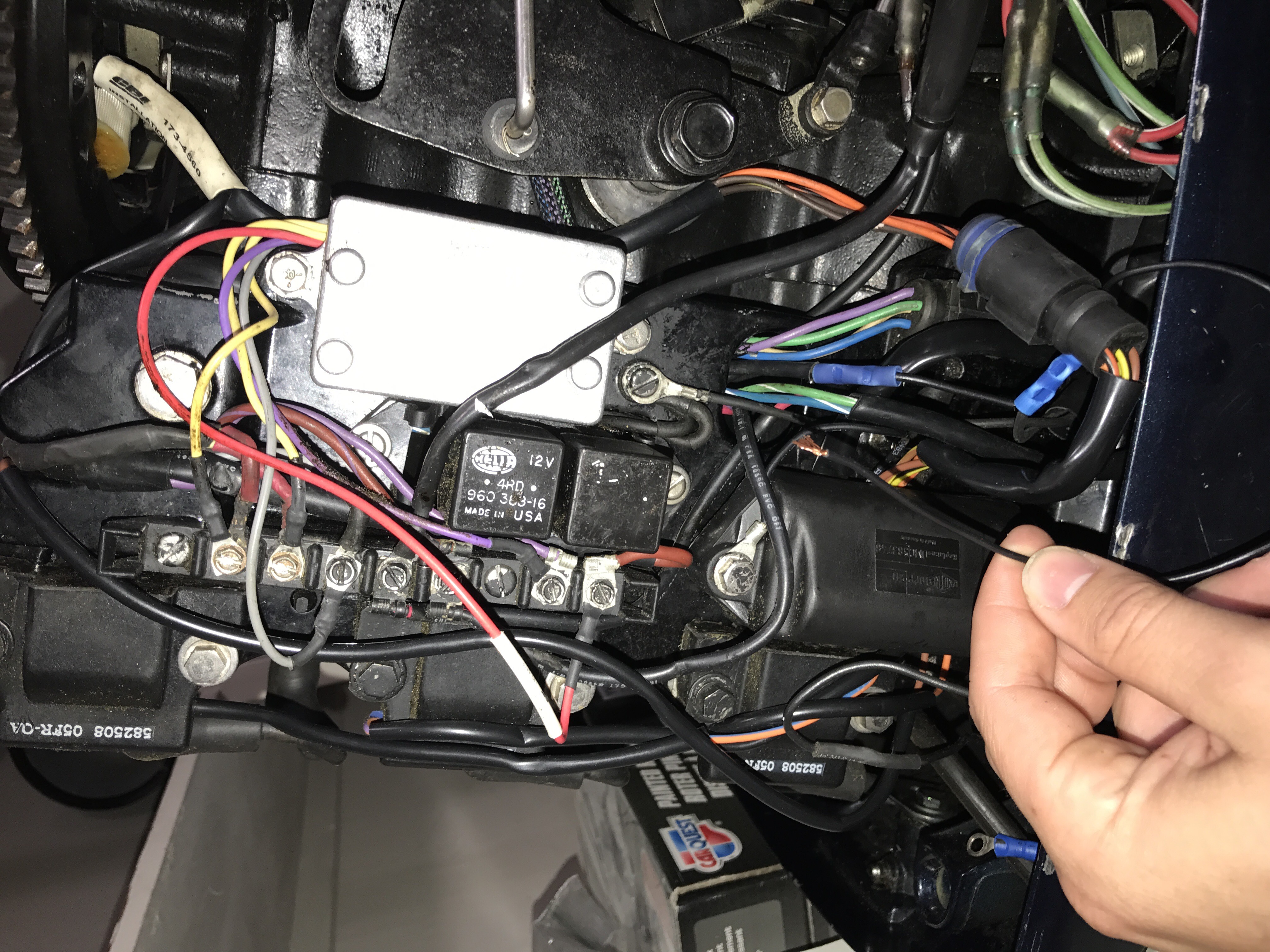Home › Forum › Ask A Member › EVINRUDE 70HP LANYARD KILL SWITCH
- This topic has 12 replies, 6 voices, and was last updated 7 years, 8 months ago by
PugetSoundBoater.
-
AuthorPosts
-
June 13, 2017 at 6:13 pm #7321
I HAVE A 1992 EVINRUDE E70TLEND. THIS IS A TILLER WITH A LANYARD KILL SWITCH. THE PREVIOUS OWNER DISCONNECTED THE UNGROUNDED KILL SWITCH WIRE INSIDE THE ENGINE COMPARTMENT. DOES ANYONE HAVE A MANUAL OR KNOW WERE THIS WIRE GOES. ANY HELP WOULD BE APPRECIATED
THANKSJOHN
June 13, 2017 at 9:23 pm #59622If memory serves, it’s a black wire with yellow tracer on the power pack.
June 13, 2017 at 11:01 pm #59627Can you post a picture?
June 13, 2017 at 11:44 pm #59635I will try to post a picture in the next few days. Engine is at a remote location.
June 16, 2017 at 7:46 pm #59795June 17, 2017 at 9:38 pm #59838John
Is the model number: J70TLEND or J70TTLEND? The reason I ask is because the model number you posted is for a remote control version of this engine, the model number I mentioned is for the Tiller controlled model. So, if the model number you mentioned is correct, this means the engine was converted from remote control to tiller control by the dealer/owner. I am very concerned because I see those two butt connectors above your fingers which means the original wiring harness was messed with…The rectangular black box behind your fingers is the power pack….There are two main harness’ coming out of the power pack, we are looking for the black/yellow lead that is coming out of the powerpack. It may be in one of those two harnesses, or it may be a single lead coming out of the power pack. Unfortunately, it looks like this engine has had many electrical parts replaced, and none of the wiring is where it should be.
That single lead coming from the tiller stop switch you have in your hand might be its ground lead, or it might be the lead that is tied into the stop circuit (black/yellow lead) in the engine’s harness. Can you find the other lead coming out of the tiller stop switch?
Does the engine shut off when you turn the key switch off? The black/yellow lead on the key switch ties into the black/yellow lead on the tiller handle, eventually leading to the powerpack. The engine is shut off when the black/yellow lead is grounded, either through the key switch or tiller stop button, this drains the powerpack’s capacitor.
Keep in mind that the tiller stop button might be disconnected because it is broken/shorted. Unfortunately, this was a common problem…The owner may have opted to just eliminate the stop button instead of paying $75 for a cheesy new tiller stop button….
I will try to find a wiring harness that may help you out…
DonJune 18, 2017 at 7:11 pm #59886Thanks for all the info. The model # is E70TLEND. I tend to agree with you about someone converting this unit from a remote control to a tiller. It has a cable that looks like it was a remote cable. I have not had time to check out what looks like a remote cable to see what wires it has and the colors. I found a wiring diagram at the public library, but it was for a 1998 model.The single lead in my hand is from the ungrounded side of the kill switch. The kill switch is good. Have not had time to check the key switch operation. Am working on doing a lot of boat remodeling at the same time. You have been very helpful. I hope to give the engine wiring issues number one priority next week. Thanks again, I will keep you posted.
John
June 18, 2017 at 10:10 pm #59901How do you know the tiller stop switch is good? A ohm meter test can not confirm proper operation, the ohm meter can’t analyze possible arcing situations. Like I say, these switches were not the best quality, and failed frequently. Do you know what leads those butt connectors are on? You sure don’t want butt connections anywhere in the harness, especially on the stop circuit!
OK, so the engine was originally a remote model, someone converted it….And, we don’t know if they used the proper kit with proper wiring harness, or just kind of cut and pasted the wiring….
I will look for a wiring diagram when I get home, but fear that it won’t resemble anything you have. I’m guessing the previous owner/tech just cut into the original wiring….Is the key switch on the engine or in the boat? Does the engine have the big red plug on the stbd side? I’m sure we can make the wiring work properly, it’s just a matter of making nice connections, as few as possible….
Feel free to post more pictures of the engine, its wiring, key switch, etc…June 19, 2017 at 11:26 am #59935I will post info late this sat or sun thanks
John
June 19, 2017 at 1:13 pm #59942Fleetwin:
Do you consider butt connectors unacceptable in all cases, even when properly crimped and pull tested? (Granting that "properly crimped" can be difficult to define/confirm.)
What, then, is the proper approach to restoring the integrity of a bodged-up harness?
-
AuthorPosts
- You must be logged in to reply to this topic.


